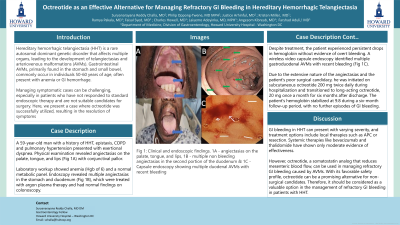Monday Poster Session
Category: GI Bleeding
P2059 - Octreotide as an Effective Alternative for Managing Refractory GI Bleeding in Hereditary Hemorrhagic Telangiectasia
Monday, October 23, 2023
10:30 AM - 4:15 PM PT
Location: Exhibit Hall

Has Audio

Suryanarayana Reddy Challa, MD
Howard University Hospital
Arlington, VA
Presenting Author(s)
Suryanarayana Reddy Challa, MD1, Philip Oppong-Twene, MD, MPH1, Justice Arhinful, MD2, Kristen Miller, MD1, Ramya Pakala, MD3, Faisal Syed, MD1, Charles Howell, MD2, Laiyemo Adeyinka, MD, MPH, FACG1, Angesom Kibreab, MD4, Farshad Aduli, MD1
1Howard University Hospital, Washington, DC; 2Howard University, Washington, DC; 3Howard University Hospital, Arlington, VA; 4Howard University Hospital, Washington, WA
Introduction: Hereditary hemorrhagic telangiectasia (HHT) is a rare autosomal dominant genetic disorder that affects multiple organs, leading to the development of telangiectasias and arteriovenous malformations (AVMs). Gastrointestinal AVMs, primarily found in the stomach and small bowel, commonly occur in individuals 50-60 years of age, often present with anemia or GI hemorrhage. Managing symptomatic cases can be challenging, especially in patients who have not responded to standard endoscopic therapy and are not suitable candidates for surgery. Here, we present a case where octreotide was successfully utilized, resulting in the resolution of symptoms
Case Description/Methods: A 59-year-old man with a history of HHT, epistaxis, COPD and pulmonary hypertension presented with exertional dyspnea. Physical examination revealed angiectasias on the palate, tongue, and lips (Fig 1A) with conjunctival pallor. Laboratory workup showed anemia (Hgb of 6) and a normal metabolic panel. He received blood transfusions for his anemia. Endoscopy revealed multiple angiectasias in the stomach and duodenum (Fig 1B), which were treated with argon plasma therapy and had normal findings on colonoscopy. Despite treatment, the patient experienced persistent drops in hemoglobin without evidence of overt bleeding. A wireless video capsule endoscopy identified multiple gastroduodenal AVMs with recent bleeding (Fig 1C). Due to the extensive nature of the angiectasias and the patient's poor surgical candidacy, he was initiated on subcutaneous octreotide 200 mg subcutaneously twice daily during hospitalization and transitioned to long-acting octreotide, 20 mg once a month for six months after discharge. The patient's hemoglobin stabilized at 9.8 during a six-month follow-up period, with no further episodes of gastrointestinal bleeding
Discussion: GI bleeding in HHT can present with varying severity, and treatment options include local therapies such as APC or resection. Systemic therapies like bevacizumab and thalidomide have shown only moderate evidence of effectiveness. However, octreotide, a somatostatin analog that reduces mesenteric blood flow, can be used in managing refractory GI bleeding caused by AVMs. With its favorable safety profile, octreotide can be a promising alternative for non-surgical candidates. Therefore, it should be considered as a valuable option in the management of refractory GI bleeding in patients with HHT

Disclosures:
Suryanarayana Reddy Challa, MD1, Philip Oppong-Twene, MD, MPH1, Justice Arhinful, MD2, Kristen Miller, MD1, Ramya Pakala, MD3, Faisal Syed, MD1, Charles Howell, MD2, Laiyemo Adeyinka, MD, MPH, FACG1, Angesom Kibreab, MD4, Farshad Aduli, MD1. P2059 - Octreotide as an Effective Alternative for Managing Refractory GI Bleeding in Hereditary Hemorrhagic Telangiectasia, ACG 2023 Annual Scientific Meeting Abstracts. Vancouver, BC, Canada: American College of Gastroenterology.
1Howard University Hospital, Washington, DC; 2Howard University, Washington, DC; 3Howard University Hospital, Arlington, VA; 4Howard University Hospital, Washington, WA
Introduction: Hereditary hemorrhagic telangiectasia (HHT) is a rare autosomal dominant genetic disorder that affects multiple organs, leading to the development of telangiectasias and arteriovenous malformations (AVMs). Gastrointestinal AVMs, primarily found in the stomach and small bowel, commonly occur in individuals 50-60 years of age, often present with anemia or GI hemorrhage. Managing symptomatic cases can be challenging, especially in patients who have not responded to standard endoscopic therapy and are not suitable candidates for surgery. Here, we present a case where octreotide was successfully utilized, resulting in the resolution of symptoms
Case Description/Methods: A 59-year-old man with a history of HHT, epistaxis, COPD and pulmonary hypertension presented with exertional dyspnea. Physical examination revealed angiectasias on the palate, tongue, and lips (Fig 1A) with conjunctival pallor. Laboratory workup showed anemia (Hgb of 6) and a normal metabolic panel. He received blood transfusions for his anemia. Endoscopy revealed multiple angiectasias in the stomach and duodenum (Fig 1B), which were treated with argon plasma therapy and had normal findings on colonoscopy. Despite treatment, the patient experienced persistent drops in hemoglobin without evidence of overt bleeding. A wireless video capsule endoscopy identified multiple gastroduodenal AVMs with recent bleeding (Fig 1C). Due to the extensive nature of the angiectasias and the patient's poor surgical candidacy, he was initiated on subcutaneous octreotide 200 mg subcutaneously twice daily during hospitalization and transitioned to long-acting octreotide, 20 mg once a month for six months after discharge. The patient's hemoglobin stabilized at 9.8 during a six-month follow-up period, with no further episodes of gastrointestinal bleeding
Discussion: GI bleeding in HHT can present with varying severity, and treatment options include local therapies such as APC or resection. Systemic therapies like bevacizumab and thalidomide have shown only moderate evidence of effectiveness. However, octreotide, a somatostatin analog that reduces mesenteric blood flow, can be used in managing refractory GI bleeding caused by AVMs. With its favorable safety profile, octreotide can be a promising alternative for non-surgical candidates. Therefore, it should be considered as a valuable option in the management of refractory GI bleeding in patients with HHT

Figure: Fig 1: Clinical and endoscopic findings. 1A - angiectasias on the palate, tongue, and lips, 1B - multiple non bleeding angiectasias in the second portion of the duodenum & 1C - Capsule endoscopy showing multiple duodenal AVMs with recent bleeding
Disclosures:
Suryanarayana Reddy Challa indicated no relevant financial relationships.
Philip Oppong-Twene indicated no relevant financial relationships.
Justice Arhinful indicated no relevant financial relationships.
Kristen Miller indicated no relevant financial relationships.
Ramya Pakala indicated no relevant financial relationships.
Faisal Syed indicated no relevant financial relationships.
Charles Howell indicated no relevant financial relationships.
Laiyemo Adeyinka indicated no relevant financial relationships.
Angesom Kibreab indicated no relevant financial relationships.
Farshad Aduli indicated no relevant financial relationships.
Suryanarayana Reddy Challa, MD1, Philip Oppong-Twene, MD, MPH1, Justice Arhinful, MD2, Kristen Miller, MD1, Ramya Pakala, MD3, Faisal Syed, MD1, Charles Howell, MD2, Laiyemo Adeyinka, MD, MPH, FACG1, Angesom Kibreab, MD4, Farshad Aduli, MD1. P2059 - Octreotide as an Effective Alternative for Managing Refractory GI Bleeding in Hereditary Hemorrhagic Telangiectasia, ACG 2023 Annual Scientific Meeting Abstracts. Vancouver, BC, Canada: American College of Gastroenterology.
